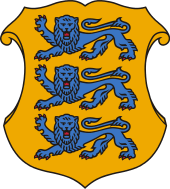Sport in Estonia
Sport plays an important role in Estonian culture. Estonia first competed as a nation at the 1920 Summer Olympics, although the National Olympic Committee was established in 1923. Estonian athletes took part at every Olympic Games until the country was annexed by the Soviet Union in 1940. The 1980 Summer Olympics sailing regatta was held in the capital city Tallinn. Estonia has won most of its Olympic medals in wrestling, athletics, weightlifting, and cross-country skiing.[1]
| Part of a series on the |
| Culture of Estonia |
|---|
 |
| History |
| People |
| Languages |
|
Mythology and folklore
|
| Cuisine |
| Festivals |
| Religion |
|
Art |
|
Literature |
|
Media
|
| Sport |
|
Monuments |
|
Basketball
Basketball is also a notable sport in Estonia. The domestic top-tier basketball championship is called the Korvpalli Meistriliiga. BC Kalev/Cramo are the most recent champions, having won the league in the 2017–18 season. University of Tartu team has won the league a record 26 times. Estonian clubs also participate in European and regional competitions. Estonia national basketball team previously participated in 1936 Summer Olympics, appeared in EuroBasket four times. They have twice finished FIBA EuroBasket on 5th place. Estonian national team also competed at the EuroBasket 2015.
Beach volleyball
- Kristjan Kais and Rivo Vesik were playing at the FIVB World Tour. In 2007, they won Zagreb Open and competed at the 2008 Summer Olympics.
Cricket
Estonia is also home to a unique variant of the game in Ice Cricket. The Ice Cricket World Championship is held annually in the Estonian city of Tallinn and is played upon the surface of a frozen lake. These tournaments last from January until late March. In 2007, saw the formation of the Estonia Cricket Association. The league consists of four Tallinn based teams who compete in a round robin format. Players who are members of the Estonian Cricket Association are eligible to be selected for the national cricket team.
Cycling
- Jaan Kirsipuu has been the best Estonian road bicycle racer. He has won 4 Tour de France stages and 1 Vuelta a España stage. Kirsipuu also wore the yellow jersey for six days in the 1999 Tour de France.
- Erika Salumäe is an Estonian track bicycle racer who won the first Olympic gold medal for Estonia after the country regained its independence in 1991.
- Tanel Kangert has finished inside top 20 all the three Grand Tours - 13th place in 2013 Giro d'Italia, 11th place in 2013 Vuelta a España and 20th place in 2014 Tour de France. In 2014 Tour de France he helped Vincenzo Nibali to take the first place in General classification.
- Rein Taaramäe finished the 2011 Tour de France in 11th place and won the 14th stage of 2011 Vuelta a España. He also held the white jersey for Stage 8 and 9 in the 2012 Tour de France.
- Aavo Pikkuus won 1976 Olympic gold medal with Soviet Union team time trial event.
Fencing
Épée Fencing has been very successful for Estonia in the past few decades. Oksana Jermakova became the first fencing World Champion for Estonia winning Individual Épée in 1993. Irina Embrich has won some medals in the past years. Nikolai Novosjolov became the world champion in 2010 and 2013. At 2013 Championships Julia Beljajeva also won the gold medal. Both team épée, women's and men's, have won championship medals.
Estonia has won 17 World Fencing Championships medals and several European Fencing Championships medals.
- Notable fencers in Estonia: Nikolai Novosjolov, Julia Beljajeva, Katrina Lehis, Irina Embrich, Erika Kirpu, Kristina Kuusk, Sven Järve, Kaido Kaaberma, Maarika Võsu and Oksana Jermakova.
Floorball
Floorball is gaining popularity in Estonia, because of some recent success of the men's national team. The Estonia national floorball team finished the 2008 World Championships in 8th place, reached Quarterfinals in 2010, finished the 2012 World Championships in 9th place and 2014 World Championships in 8th place.
Football
Football is one of the most popular sports in Estonia, although no minor honour has been achieved. Estonia advanced to the 2012 UEFA European Football Championship qualifying play-offs against the Republic of Ireland.
Formula racing
- Marko Asmer is an Estonian auto racing driver, whose career in single seater junior formula is notable for his British Formula Three Championship title in 2007. Asmer is also the first Estonian to test a Formula One car.
- Kevin Korjus is an Estonian racing driver. He won the Eurocup Formula Renault 2.0 championship in 2010 and finished seventh in the GP3 Series in 2013.
- Ralf Aron is an Estonian racing driver. He became champion in the Italian F4 Championship in 2015.
Freestyle skiing
Kelly Sildaru won women's slopestyle at 2015 Dew tour. At just 13 years old, Kelly Sildaru might be the smallest competitor in the field, but she brought the biggest run of the contest, spinning all four directions and showcasing technicality on the rails in the process. On the jumps, Kelly landed a switch right 900, right corked 720, switch left 900 and left 720, and the judges rewarded her with a 90.80 to put her into 1st place.
Kelly won Gold in the slopestyle event in the 2016 Winter X Games beating Tiril Sjåstad Christiansen. With this win, at age 13, Kelly became the youngest gold medalist to date at an X Games winter event.
Ice hockey
The Estonia men's national ice hockey team is currently ranked 27th in the world. During the Soviet period, Estonia was part of the successful Soviet Union national ice hockey team.
Judo
Judo is one of the most successful field of sport for Estonia. Since 1996, Estonia has won several medals in major international competitions.
- 3 Olympic medals
- 4 World Judo Championships medals
- 15 European Judo Championships medals.
- Indrek Pertelson, Aleksei Budõlin and Martin Padar are the most famous Judo athletes in Estonia in the past years.
Motocross
- Tanel Leok is an Estonian motocross racer competing in the Motocross World Championship in MX1 class.
Rallying
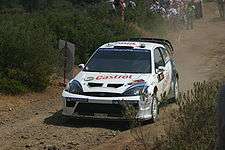
- Markko Märtin was the first Estonian who won a number of rallies in the World Rally Championship. Markko has scored 5 WRC victories, total of 18 podium finishes, 207 points and 101 stage wins. In 2004, he finished the season with 3rd place. Markko was one of the best rally drivers, but retired after an accident in 2005. Thousands of rally fans from Estonia are still interested in WRC, visiting Rally Finland and other rallies.
- Ott Tänak is 2019 WRC Champion, and Martin Järveoja won the FIA World Rally Championship for Co-Drivers that season. Previously Tänak had repeated Märtin's achievement by finishing 3rd overall in 2017, winning his fifth rally in August 2018 and eventually surpassing Märtin by winning his sixth rally in September 2018. Tänak also finished 3rd overall in 2018, winning three rallies in a row and mathematically still being in the title race at the last rally of the season. He was the highest pointscorer for Toyota Gazoo Racing WRT that season, who won the Manufacturer's Championship that season.
Rowing
Rowing is a popular sport in Estonia. One reason is Jüri Jaanson, but there are also other well-known rowers in Estonia. Between 2004–2009, Estonia scored at least one medal in major international competition in every year: 2004, 2005, 2006, 2007, 2008, and 2009. After six years Estonia won bronze medal in 2015.
Tõnu Endrekson, Andrei Jämsä, Allar Raja and Kaspar Taimsoo have also won an Olympic medal.
Sailing
Twin brothers Tõnu Tõniste and Toomas Tõniste competed in four consecutive Summer Olympics, starting in 1988. They won a silver and a bronze medal in the Men's 470 Class, for the Soviet Union (silver, 1988) and for Estonia (bronze, 1992).
Skiing
Skiing is very popular in Estonia. Otepää is a popular skiing resort. Otepää is also known as the "winter capital" of Estonia (in contrast to the "summer capital" Pärnu). It is also the annual Cross-country skiing World Cup event. The 2011 Nordic Junior World Ski Championships was held in Otepää also.
In 2000, Raul Olle won Vasaloppet, which is considered as one of the oldest, one of the longest, and in popular consideration the biggest cross-country ski race in the world.
In 1999, when Estonian skiing found success at international level, winning medals at World Championships. Estonia has won 4 gold, 2 silver and 1 bronze medal at the Winter Olympic Games.
Andrus Veerpalu, Kristina Šmigun-Vähi and Jaak Mae are some of the most popular athletes in Estonia.
Speed skating
- Ants Antson (competing for the Soviet Union) won a gold medal at the 1964 Winter Olympics in Innsbruck, Austria for the 1500m. The same year he became the European Allround Champion and received the Oscar Mathisen Award.
Swimming
- Swimming is a popular sport among Estonians. Estonian athletes have found some success at the European Short Course Swimming Championships – Indrek Sei, Jane Trepp, Triin Aljand and Martti Aljand have won medals in the past years.
- Triin Aljand won first long course swimming medal for Estonia in Debrecen 2012.
Tennis
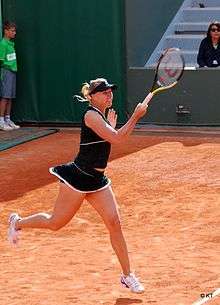
- Kaia Kanepi is an Estonian professional female tennis player. Her career-high ranking was set at World No. 16 on 7 February 2011.[2] Kanepi won her first WTA Tour Title in Palermo in 2010, becoming the first Estonian female player to win a WTA title. She has also reached six Grand Slam Quarter-finals, becoming the first Estonian to achieve this and was the first Estonian to be ranked in the top twenty.
- Jürgen Zopp made a breakthrough on the ATP tour in 2012, qualifying for the main draws of each the Australian Open, Roland Garros, and Wimbledon, and achieving his first main draw ATP tournament win in Bucharest, establishing himself as a top-100 player in the world rankings.
- Anett Kontaveit has won one singles title on the WTA tour as well as eleven singles and five doubles titles on the ITF tour during her career. In April 2019, she reached her best singles ranking of world number 14.
Track and field
Track and field is gaining popularity in Estonia, shown by some of the recent success in this field of sport. Jüri Lossmann came in second on the marathon at the 1920 Olympic Games. Aleksander Klumberg won the bronze medal in 1924 in the men's decathlon competition. Between 2000–2009, Estonia scored at least one medal in major international competition in every year: 2000, 2001, 2002, 2003, 2004, 2005, 2006, 2007, 2008, and 2009. Before that, Erki Nool won the gold medal in 1998.
- Notable track and field athletes in Estonia: Erki Nool, Gerd Kanter, Andrus Värnik, Rasmus Mägi, Aleksander Tammert, Pavel Loskutov, Jüri Lossmann, Aleksander Klumberg
Volleyball
- The Estonia men's national volleyball team finished the 2009 European Volleyball Championship in 14th place, the 2011 European Volleyball Championship in 12th place and the 2015 European Volleyball Championship in 11th place.
Weightlifting
Weightlifting was one of the most successful field of sport for Estonia in the past. Alfred Neuland competed in the 1920 and 1924 Olympics and won a gold and a silver medal, respectively, becoming the first Olympic gold medalist from Estonia. Alfred Schmidt was a featherweight weightlifter who won a silver medal at the 1920 Summer Olympics. Arnold Luhaäär competed in the 1928 and 1936 Olympics and won a silver and a bronze medal, respectively. Jaan Talts won a silver medal in weightlifting for the Soviet Union at the 1968 Olympic games and a gold medal at the 1972 Olympic games.
- Other notable weightlifters in Estonia: Jaan Kikkas, Harald Tammer and Mart Seim.
Wrestling
Wrestling was the most successful and also very popular Olympic event for Estonia between 1920–1936. In 2006, Heiki Nabi became the first amateur wrestling World Champion for Estonia. At the 2012 Summer Olympics, Nabi won the silver medal in the Men's Greco-Roman 120kg. Nabi continued his great career winning second gold medal at 2013 World Championships and bronze medal at 2014 World Championships.
- Notable wrestlers in Estonia: Aleksander Aberg, Georg Hackenschmidt, Georg Lurich, Osvald Käpp, Martin Klein, Anton Koolmann, Johannes Kotkas, Albert Kusnets, August Neo, Eduard Pütsep, Voldemar Väli and female wrestler Epp Mäe.
- Kristjan Palusalu is one of the most well-known athletes in Estonia even though he competed 80 years ago in the 1936 Summer Olympics.
Other sports
- Sumo wrestling hasn't been popular in Estonia, but Baruto found real success in this sport.
- Margus Hunt is an Estonian American football defensive end, playing in the National Football League (NFL). He was junior world champion in shot put and discus throw, having never played football before starting university in the US.
- Andrus Murumets is an Estonian strongman. He won Strongman Champions League in 2009.
- Kiiking, a relatively new sport, was invented in 1996 by Ado Kosk in Estonia. Kiiking involves a modified swing in which the rider of the swing tries to go around 360 degrees.
- Estonia has also won many medals in ice yachting competitions.
- Estonian sportsmen have also won several medals at inshore powerboat racing championships.
- Robin Kool, also known as Ropz, is a professional Counter-Strike: Global Offensive player, joining Mousesports at the age of 17.
Gallery
Gallery of famous Estonian sportspeople
See also
- Estonia at the Olympics
- Estonia national bandy team
- Rugby union in Estonia
- List of Estonian sportspeople
- Category:National sports teams of Estonia
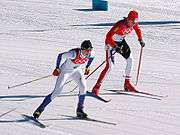
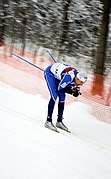
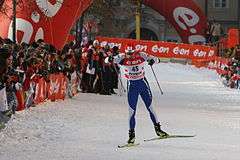
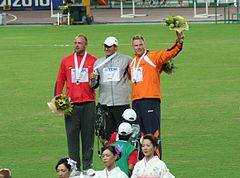
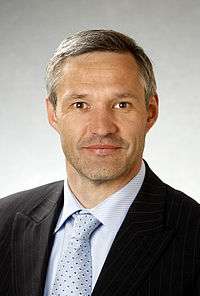
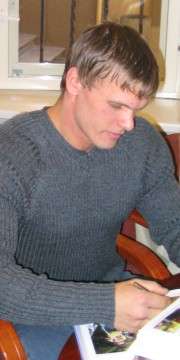
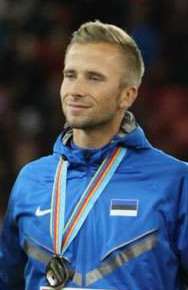
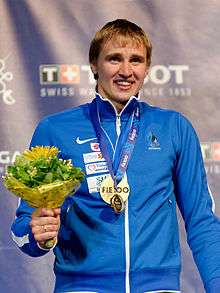
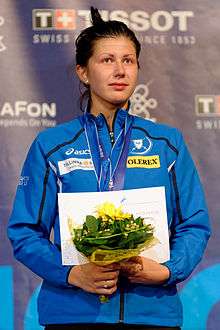
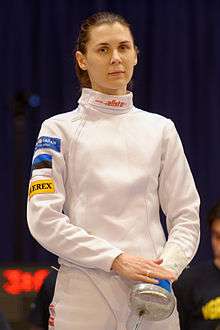
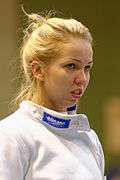
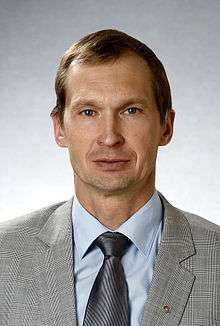
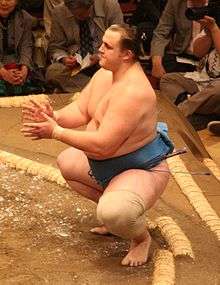
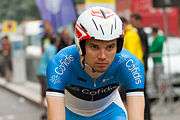
.jpg)
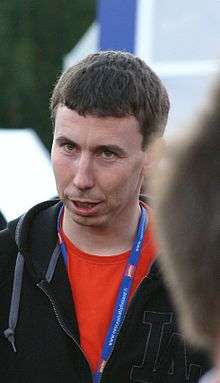
_(9383543716).jpg)
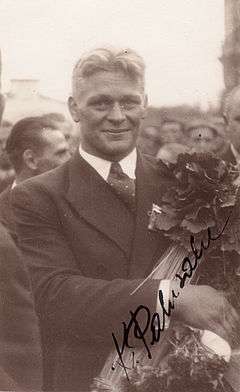
_(14627004303).jpg)

